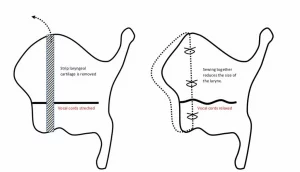Voice specialists help singers through targeted therapy, technique correction, surgical intervention, and performance coaching. These treatments address vocal fatigue, hoarseness, range problems, and performance anxiety that commonly affect professional and amateur singers.
Studies show that 60% of professional singers experience voice problems during their careers, making specialist intervention crucial for long-term vocal health and career sustainability.
To see a Voice Specialist In London, Contact Nick Hamilton Today on 020 7034 6053
What Vocal Problems Do Singers Commonly Experience?
Singers frequently encounter vocal fatigue, hoarseness, reduced range, and pitch instability. These issues often stem from overuse, poor technique, or inadequate vocal preparation for demanding performance schedules.
Common conditions include vocal nodules, polyps, and muscle tension dysphonia. These problems typically develop gradually, initially appearing as slight hoarseness or difficulty hitting certain notes before progressing to more significant limitations.
Environmental factors such as air conditioning, dust, and dehydration compound these issues. Performance anxiety can also manifest as vocal tension, creating a cycle where worry about voice problems actually exacerbates the condition.
Can Voice Specialists Help With Performance Anxiety?
Yes, voice specialists address both physical and psychological aspects of performance anxiety. Vocal tension often accompanies nervousness, creating breathiness, tremor, or complete voice loss at crucial moments.
Treatment involves relaxation techniques, breathing exercises, and confidence-building strategies. Specialists teach performers how to recognise early signs of tension and implement immediate coping mechanisms.
Many singers find that addressing the physical symptoms of anxiety helps reduce the psychological component. When breathing and vocal placement feel secure, overall confidence naturally improves.
How Do Voice Specialists Diagnose Singing Problems?
Diagnosis begins with a thorough vocal assessment including voice quality evaluation, range testing, and endoscopic examination. This allows specialists to identify structural issues, muscle tension patterns, and technique problems.
Advanced technology such as stroboscopy provides detailed visualisation of vocal cord movement, revealing subtle abnormalities that might not be apparent during routine examination. This precision helps target treatment effectively.
Performance history analysis is equally important. Specialists examine repertoire demands, practice schedules, and performance environments to identify contributing factors and develop personalised treatment plans.
What Treatments Are Available For Vocal Problems?
Treatment options range from conservative voice therapy to surgical intervention, depending on the specific condition and severity. Voice therapy remains the first-line treatment for most functional voice disorders.
Therapy typically includes technique modification, vocal exercises, and lifestyle adjustments. Singers learn proper warm-up routines, breathing techniques, and strategies for vocal conservation during busy performance periods.
For structural problems such as nodules or polyps, surgical intervention may be necessary. However, surgery is typically combined with voice therapy to ensure optimal healing and prevent recurrence.
Can Singers Return To Full Performance After Treatment?
Yes, most singers can return to full performance with appropriate treatment and rehabilitation. Research indicates that 85% of professional singers successfully return to their previous performance level following targeted voice therapy.
Recovery timelines vary depending on the condition and treatment approach. Minor technique adjustments may show improvement within weeks, while recovery from surgery typically requires several months of careful rehabilitation.
The key to successful return lies in gradual progression, ongoing maintenance, and lifestyle modifications. Many singers find that treatment actually improves their overall vocal performance, providing better control and endurance than before.
How Can Singers Prevent Future Vocal Problems?
Prevention focuses on proper technique, vocal hygiene, and smart performance scheduling. Regular warm-ups, adequate hydration, and appropriate rest periods between performances significantly reduce injury risk.
Working with qualified voice teachers and maintaining regular specialist check-ups helps identify problems early. Professional singers benefit from ongoing support rather than seeking help only when problems arise.
Understanding personal vocal limits and respecting them is crucial for career longevity. This includes knowing when to cancel performances, modify repertoire, or take extended vocal rest periods.
Don’t let vocal problems derail your singing career. Contact Nick Hamilton today for a comprehensive vocal assessment and personalised treatment plan to restore your voice and protect your future performances.
See Also:




